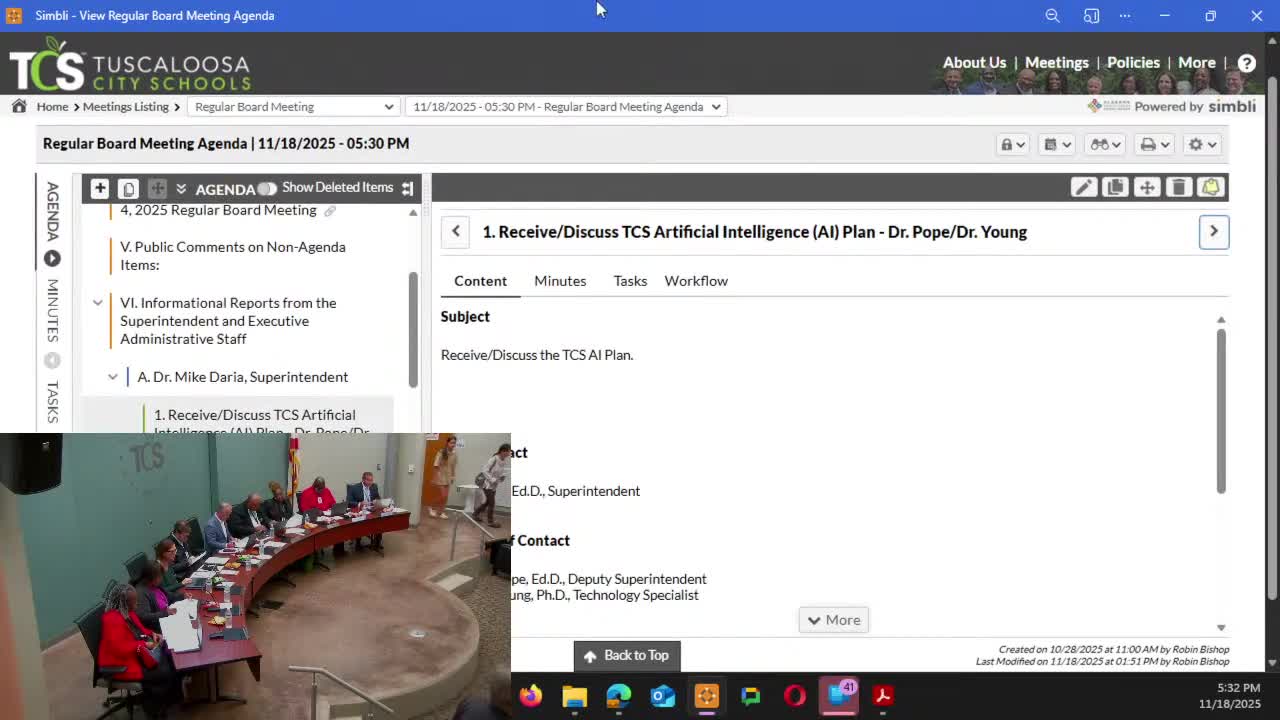Tuscaloosa City Schools outlines AI plan to support teachers, engage students and host family workshops
Get AI-powered insights, summaries, and transcripts
Subscribe
Summary
Tuscaloosa City Schools presented an AI rollout focused on using chatbots and classroom tools as instructional support, launching staff AI literacy courses and holding a family workshop Jan. 29, 2026, while flagging data-governance and academic-integrity concerns.
Tuscaloosa City Schools on Nov. 18 received an informational briefing on the district—s artificial intelligence plan that emphasized using AI tools to support teachers, personalize learning and engage families.
Dr. Pope, who led the presentation, said the district—s goals are to "empower our teachers" to use AI as support rather than a replacement, to "engage students" with future-ready skills, and to build family trust through transparency. She described pilot tools the district is testing, including a chatbot built on Google Gemini that has been populated with material related to 504 plans so teachers can ask practical questions about scheduling and implementation.
The presentation highlighted three classroom use cases: middle-school students feeding notes into a chatbot to generate study guides and projects; a resume-support tool used at the TCCA campus tied to career and trade skills; and teacher-created coding and simulation activities shown in in-class demos. Dr. Young described teacher-led demos at Westline and Eastwood where teachers used AI-based coding tools to design lessons and activities, reporting strong early teacher engagement.
Board members questioned how parents had reacted to pilots and whether AI could replace teachers or exacerbate inequities. One member asked about real-time translation earpieces for non-English-speaking students. Dr. Pope replied that the district aims for AI to be a classroom support, not the primary driver of instruction, and that earlier pilots were paused to address data-collection concerns. "We can't run away from it. We can't be shy of it," she told the board, adding that the district plans clear communications and training for families and staff.
The district plans asynchronous AI professional development through Schoology (beginner to advanced levels), targeted leader trainings, and a community event called "AI for Families" at the Tuscaloosa Public Library on Jan. 29, 2026, 6–7 p.m. Organizers said the event will demonstrate tools, explain data safeguards and let parents try the platforms to reduce misunderstanding. The presenters said the district collected input from roughly 250 families as it designs next steps.
No formal action was required; the briefing was informational. The district—s next step is to finalize platform choices for classified staff training, continue piloting classroom tools, and prepare the January family workshop.
